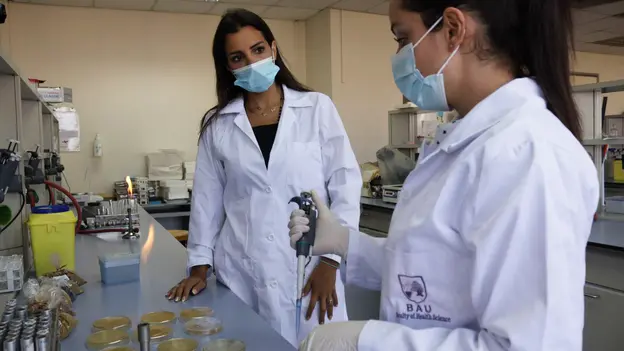Tandem Project
Spices, Herbs and Oils: Aspects of Food Safety and Cultural Heritage
Laboratory Study
Spices, herbs, and oils are usually consumed in small quantities in a wide range of foods and food products all over the world. They not only improve the taste of food, but serve as a valuable source of vitamins, iron, calcium, and other antioxidants. Next to its nutritional value and culinary meaning, spices, herbs and oils serve as cultural signifier in native foods, because most non-European cuisines are based on a carefully orchestrated use of different flavors. In the past, spices were a precious commodity. Next to its culinary uses, they are also central to spiritual, medical, and cosmetic aspects of life. Spice trade became a driving force to expand trade routes worldwide. Notions about what is safe to eat reaches far back to old traditions and customs of local communities. Foods are valued differently and that influences the evolving relationship between food production and food consumption communities. Combining research in the field of food chemistry with historical and cultural approaches to spices, herbs, and oils, this project embraces the complexity of the topic.
Spices and herbs as unique segment in the food sector
Spices and herbs are distributed mostly in their dried, low water activity forms and are associated with very complex production and distribution chains. Special requirements with regard to food safety standards apply to these particular commodities. Chemical and microbial contamination are a threat to food safety and create trade barriers when exporting the products. Existing tools for decontamination, such as steam sterilizers and microwaves, have been extensively utilized for decontaminating spices and herbal blends. However, most of these processes have had a detrimental effect on the quality of the herbs.
Finding new treatment methods to decontaminate spices and herbal mixtures
AGYA member Prof. Dr. Nada El Darra followed an innovative approach based on a novel thermo-mechanical sterilizing technology. This technology implements a treatment step called ‛Intensification of Vaporization by Decompression to the Vacuum (short IVDV)’ reducing energy cost and water consumption compared to other steam sterilizer treatments significantly. At the same time, the sensory properties as well as the quality of the spices and herbs are preserved. Solar energy is used in the final drying process, making it a more sustainable method of decontaminating food.
Nada El Darra led a team to test and investigate this new treatment approach in the facilities of the Saint Joseph University of Beirut. Afterwards, the spice samples were analyzed at the University of Göttingen in Germany to validate the effect of the IVDV-treatment on the food quality, focusing on the essential oil profile of the studied spices as well as their antioxidant and antibacterial activity. The prototype IVDV device developed in this project could be scaled up to enable spice factories to decontaminate their spices and herbal blends on a production scale to access new markets.
Cultural, economic and social aspects of spice consumption
Project partner AGYA member Dr. Luise Fischer added aspects on the historical, cultural, economic, and social practices and benefits of spice and herb consumption. Spices not only improve the taste and nutritional value of food, but are also part of a shared cultural heritage. Given the cultural aspects of food and food safety, she gave insights into the cultural history of selected spices such as thyme, among others. Thyme originates in the Mediterranean region and is connected to many ancient cultures along the Mediterranean: Sumerians, ancient Egyptians and Greeks. Today, Thyme is known as a perennial herb with high aromatic qualities and contributes to the diversity of people’s diets worldwide. In joint meetings, the research team exchanged on the culture and safety nexus of food in general as well as spices and herbs in particular.
- Disciplines Involved
- Food Engineering, Food Microbiology, Sustainable Development Studies, Geography, International Economics
- Cooperation Partners
- Saint Joseph University of Beirut, Lebanon
- Beirut Arab University, Lebanon
- University of Göttingen, Germany
- Leibniz University Hannover, Germany
- Project Title
- Steam Sterilization of Spices and Herbs, and Oil Extraction for Subsequent Food Applications
- Year
- 2022
- Funding Scheme
- Tandem Project
- Countries Involved
- Lebanon, Germany
- AGYA Publication
- Microbial Decontamination of Cuminum cyminum Seeds Using “Intensification of Vaporization by Decompression to the Vacuum”: Effect on Color Parameters and Essential Oil Profile
- Optimization of Aqueous Extraction of Polyphenols from Cuminum cyminum Seeds Using Response Surface Methodology and Assessment of Biological Activity
- Spice Up Your Life! When East Meets West. An Aromatic Adventure




